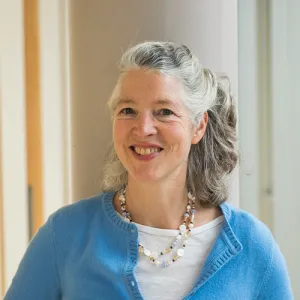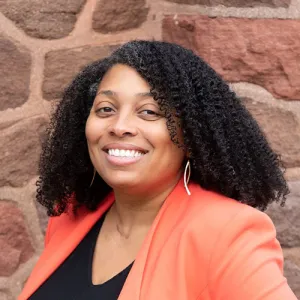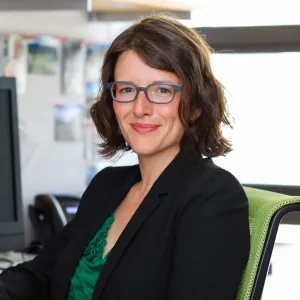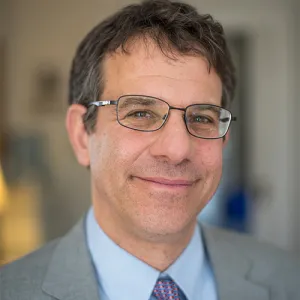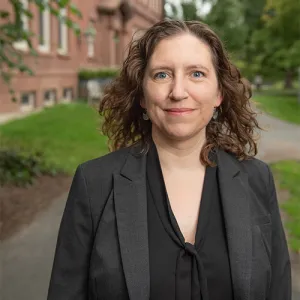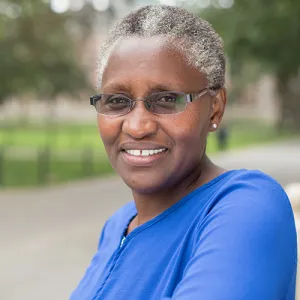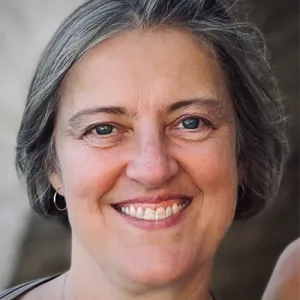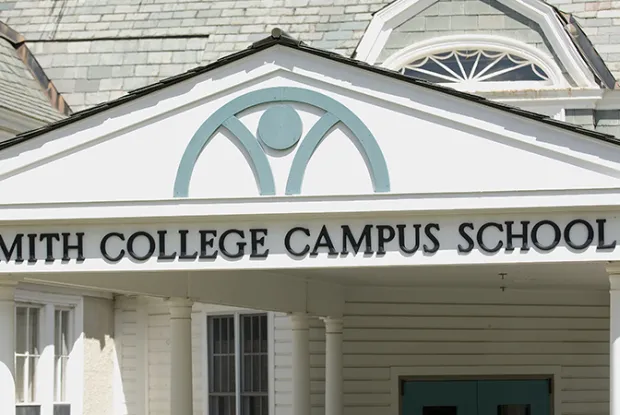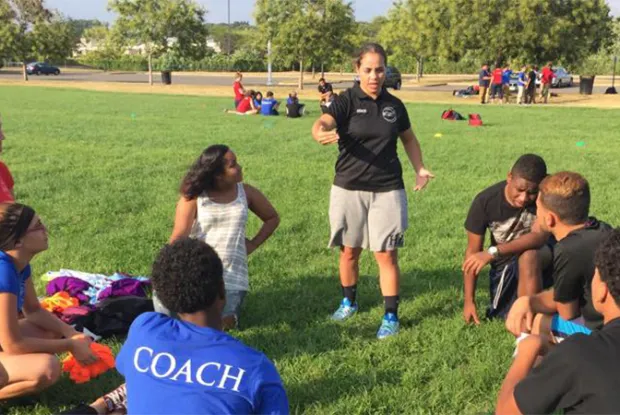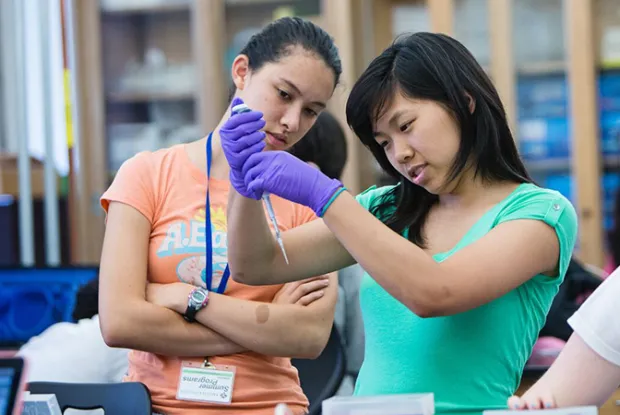
Education & Child Study
Education and the study of learning touch every aspect of human activity. At the Smith College Department of Education and Child Study, we believe teaching and the study of how people learn are central to the health and future of our rapidly changing and diverse society. Preparing for a teaching career—which can include obtaining your MAT at Smith—is foremost among the reasons for studying education, but it can also be an important foundation for other fields, such as history, science, literature, business and counseling.
Since 1871, Smith College has been preparing teachers and educational leaders who understand what it takes to create classrooms where students learn to engage their world critically, imaginatively and reflectively. Alumni, faculty and students work on one of the most pressing social and human questions of our time: How can educators create settings where people can learn and flourish?
Requirements & Courses
Goals for Majors in Education and Child Study
- Understand the field of education from an array of disciplinary perspectives, i.e., philosophical, historical, sociological, psychological, statistical and ethical.
- Understand the role of cultural and human diversity in the design and practice of education.
- Understand current theories of learning and how they shape principles of pedagogical practice across ages and subject matter.
- Understand current theories of human development, from infancy through adolescence.
- Understand the major factors that influence the design of learning environments.
- Understand how education policy is shaped and how to change educational practice.
- Develop applied and practical knowledge and skill to support the growth and success of beginning teachers. (These learning goals are elaborated in the description of our state approved teacher preparation programs.)
Goals for Master of Arts in Teaching
- Understand the role of cultural and human diversity in the design and practice of education.
- Understand current theories of learning and how they shape principles of pedagogical practice across ages and subject matter.
- Understand current theories of human development—infancy through adolescence.
- Understand the major factors that influence the design of learning environments.
- Develop applied and practical knowledge and skill to support the growth and success of beginning teachers. (These learning goals are elaborated in the description of our state approved teacher preparation programs.)
Education and Child Study Major
Students may major by completing either a licensure or non-licensure program. Those pursuing the licensure track will graduate with all necessary requirements to teach in Massachusetts public schools. Those taking the non-licensure track can design their major around their particular interests in the field, working in consultation with their major adviser.
Requirements
Ten courses
- Three foundations courses (breadth), one in each of the three areas, completed by the end of sophomore year
- One course in the science of learning: EDC 238
- One course in human development: EDC 235
- One course in settings and contexts: EDC 231 EDC 278, EDC 243
- , Three courses in a single curricular strand (depth)
- Teaching and Learning: EDC 212, EDC 231, EDC 240, EDC 311, EDC 338, EDC 243, EDC 345ws, EDC 345ms, EDC 346, EDC 347, EDC 352, EDC 390, ENG 399, HST 390, SPN 299/ FRN 299/ ITL 299/ POR 299 , EDC 345L, EDC 352L
- Youth, Community and Policy: EDC 200, EDC 239, EDC 298, EDC 299, EDC 331, EDC 396, EDC 341,FYS 145
- International/Global Education: EDC 216, EDC 237, EDC 278, EDC 243,EDC 278
- Three electives, selected in consultation with the major adviser and chosen from Smith offerings, offerings from the Five Colleges and/or the student’s study abroad program.
- Capstone course: EDC 340, taken during the spring semester of the senior year
Courses fulfilling major requirements may not be taken S/U.
Honors
Please consult the director of honors or the departmental website for specific requirements and application procedures. It is important to begin this process junior year.
The Education and Child Study Minor
The minor requires six courses. Minors are student initiated and decided in consultation with a departmental adviser. Students interested in pursuing a minor should contact a faculty member in the department as soon as possible. Courses required for the minor in education and child study may not be taken S/U.
Course Information
Teaching and Learning Strand
The foundational ideas of the Teaching and Learning strand are about how people learn, how they develop, and how this knowledge should influence teaching and the design of learning environments. Learning environments include classrooms and also less formal settings such as museums, after-school and summer programs. Inclusion, individual differences, and the demands of different subject matter are important considerations in all decisions about learning environments. Core ideas about teaching and learning inform public policy and the creation of educational standards. Students interested in any of the diverse topics related to learning and teaching should find a home in this strand. The Teaching and Learning Strand is well suited for students who are preparing to teach, and licensure requirements are embedded in this strand.
Youth, Community and Policy Strand
The Youth, Community and Policy strand within the major is intended to equip students with the knowledge and skills needed to design, lead, research, evaluate, and work in educational settings. Courses within the strand provide a theoretical grounding in learning science, development, youth policy, and leadership while teaching applicable skills for working with and for youth in school and out-of-school settings. Students pursuing this strand are required to have a school and out-of-school experience as part of the major, through community service learning placements, summer work (including PRAXIS), Urban Education Initiative, Project Coach or other course-based placements. The Youth, Community and Policy strand is well suited for students who are preparing to work in research, policy, social work, out-of-school programming, counseling, as well as teaching.
International/Global Education Strand
The Global strand within the major is intended for students who have a particular interest in international and/or comparative theories, practices, and policies in education. Courses within this strand are focused on teaching and learning policies and practices outside the United States, on the history and philosophy of education in other countries, and on the status of teaching and schooling worldwide. Students pursuing this strand are encouraged to have an international experience as part of the major, either through study abroad, internships, or short term FLEX programs. Advisors will point majors towards programs abroad that are especially suited to the study of global education. Some second language experience is encouraged.
Courses
EDC 115 Digital Literacy in the Classroom (1 Credit)
The Digital Literacy in the Classroom course is designed for students who want to pursue teaching licensure or are current K-12 educators, including classroom teachers, who are working towards an MAT. This course is designed to fulfill the licensure requirements for teacher licensure as outlined by the MA Department of Elementary and Secondary Education. (E)
Fall
EDC 158 Education and the Crossroads: Issues and Challenges in Contemporary Education (4 Credits)
This course examines efforts to improve educational systems across three key areas: teaching and learning; youth, community, and policy; and international/global education. Students explore complex factors shaping educational practice and policy at classroom, school, and system levels. Through critical analysis of real-world case studies and current debates, the course cultivates understanding of educational reform challenges. Activities encourage students to draw on personal experiences while developing analytical skills. By examining questions about educational purpose, organization, and improvement, students gain tools to engage meaningfully with core issues in contemporary education. The course prepares students to think critically about challenges and opportunities in education. Enrollment limited to 35. {S}
Spring, Variable
EDC 200 Critical Perspectives in the City (4 Credits)
This course explores how the challenges facing schools in America’s cities are entwined with social, economic and political conditions present within the urban environment. The essential question: How have educators and policy makers attempted to provide a quality educational experience for youth when issues associated with their social environment often present significant obstacles to teaching and learning? Using relevant social theory to guide the analyses, students investigate school reform efforts at the macro-level by looking at policy-driven initiatives such as high stakes testing, vouchers and privatization, and at the local level by exploring the work of teachers, parents, youth workers and reformers. Fieldwork opportunities are available for students. Enrollment limited to 35.
Fall
EDC 212 Linguistics for Educators (4 Credits)
Knowledge of linguistics is a valuable tool for educators. Understanding the linguistic underpinnings of language, variation between spoken and written language, and sociolinguistic variation that exists in the classroom is beneficial in teaching reading and writing to all students and in understanding classroom discourse. Knowing how language works allows educators to recognize the linguistic issues they may encounter, including delays in reading; the effects of multilingualism on writing, speaking, and reading; and differences due to dialectical variation. This course provides a basic understanding of linguistic concepts, how written and spoken language interact and vary, and sociolinguistic variation in the classroom. Strand Designation: International/Global. Enrollment limited to 35. {S}
Fall
EDC 216 Colloquium: Feminism, Decolonialism, and Education (4 Credits)
This course centers a critical approach to studying education through feminist and decolonial perspectives. Drawing on the interdisciplinary understandings that have been advanced through these movements students will: (1) analyze education as a global phenomenon and its social purpose, (2) identify structural inequalities in education, and (3) consider how to address the legacy of colonialism in educational systems. Students will study the social construction of identity, nations, languages and knowledge to deconstruct personal and collective experiences with education while centering the embodied and material dimensions of learning. Enrollment limited to 25. {S}
Fall, Alternate Years
EDC 231 Foundations and Issues of Early Childhood Education (4 Credits)
This course explores and examines the basic principles and curricular and instructional practices in early childhood education. Students begin this examination by taking a close look at the young child through readings and discussion, classroom observations and field-based experiences in an early childhood setting. The course also traces the historical and intellectual roots of early childhood education. This leads students to consider, compare and contrast a variety of programs and models in early childhood education. This course requires weekly fieldwork in local early childhood education classrooms. Enrollment limited to 20. {S}
Spring
EDC 235 Child and Adolescent Growth and Development (4 Credits)
This course is a study of the theories of growth and development of children, from prenatal development through adolescence. This course looks at basic considerations of theoretical application to the educative process and child study and involves directed observation in a variety of child-care and educational settings. Enrollment limited to 55. {S}
Fall, Spring
EDC 237 Comparative Education (4 Credits)
This course introduces students to the field of comparative and international education. Students survey general features of educational systems and examine key educational policies and practices in select countries. They also explore a variety of theoretical approaches and research methods for understanding educational policy and practice in comparative perspective. Focus areas include: educational access, quality and equity; teacher quality and professionalism; and educational reform in a globalized context. Enrollment limited to 35. {S}
Fall, Spring, Variable
EDC 238 Introduction to the Learning Sciences (4 Credits)
This course combines perspectives on cognition and learning to examine the teaching-learning process in educational settings. In addition to cognitive factors, the course incorporates contextual factors such as classroom structure, teacher belief systems, peer relationships and educational policy. Consideration of the teaching-learning process highlights subject matter instruction and assessment. Prerequisite: a genuine interest in better understanding teaching and learning. Enrollment limited to 30. {N}{S}
Fall, Spring
EDC 239 Counseling Theory and Education (4 Credits)
This course introduces various theories of counseling and their applications to children, adolescents and families. Behaviors that signal a need for attention and counseling are discussed. Students gain knowledge about themselves as individuals and learners, and learn how to listen actively to others. Enrollment limited to 55. {S}
Fall, Spring, Variable
EDC 240 How Do We Know What Students Are Learning (4 Credits)
This course serves as an introduction to the theories, strategies and techniques that form the bases for assessing learning in classrooms. The focus is on the assumptions, strengths and weaknesses associated with various approaches. Students encounter a variety of instruments and methods used for summative and formative evaluations of student comprehension, learning needs, and academic progress. Students also develop authentic assessment tools as they work through evaluation problems associated with particular curriculum programs and instructional techniques. This course has a community-based project that requires a regular out-of-class time commitment and a final group presentation for a professional learning community of Smith College Campus School teachers and staff. Enrollment limited to 20. {S}
Fall, Spring, Variable
EDC 243 Multicultural Education (4 Credits)
This course examines the multicultural approach in education, its roots in social protest movements and its role in educational reform. The course aims to develop an understanding of the key concepts, developments and controversies in the field of multicultural education; cultivate sensitivity to the experiences of diverse people in American society; explore alternative approaches for working with diverse students and their families; and develop a sound philosophical and pedagogical rationale for a multicultural education. Strand Designation: International/Global. Enrollment limited to 35. {S}
Fall
EDC 278 Race and Education (4 Credits)
This course examines the centrality of race in education mainly in the United States but also in other parts of the world. Using an interdisciplinary lens, the course explores an array of theories of race and intersectionality as they relate to education, and interrogates related empirical research and personal narratives. Among the topics to be explored are the history of the concept of race; complexity of race and the intersections of race, ethnicity, gender, class, nationality and identity; everyday racism and racism in educational contexts; racialized educational policies and practices; and strategies for working towards racial equity in educational contexts. Enrollment limited to 35. {S}
Fall, Spring, Variable
EDC 284 Teaching and Mentoring Adolescents in Community Programs (4 Credits)
This course focuses on understanding and using a positive youth and community development framework in supporting the learning and development of youth. Students explore emerging science on youth and adolescent development while learning about evidence-based pedagogies and promising programs that support youth development in school and community programs. Students participate on a weekly basis in community-engaged placements and learn to teach, coach and mentor adolescents using the theory, principles and practices associated with positive youth development. Enrollment limited to 35. {S}
Fall
EDC 298 Rethinking Leadership and Policy Practicum (1 Credit)
This practicum is the internship with a school or educational setting designed as the companion experience to EDC 299. This experience (which involves a remote internship) provides students with an opportunity to pursue deeper understanding about the impact of current challenges facing education, teaching, school reform and educational policy. The course examines how educators can better harness what is known in the research. S/U only. Instructor permission required. Enrollment limited to 40. {S}
Interterm, Variable
EDC 299 Rethinking Leadership and Policy for Tomorrow's World (3 Credits)
This course is designed to provide students with an opportunity to pursue deeper understanding about education, teaching, school reform and educational policy while completing a remote internship in a school or educational setting. The course examines how educators can better harness what is known in the research, practice and policy arenas to ensure that all youth thrive. This course is open to all Five College students who have applied for and been accepted into the Mindich Fellowship. This course may be taken up to three times. Prerequisite: EDC 298. Enrollment limited to 40. {S}
Spring
EDC 311 Rethinking Equity and Teaching for English Language Learners (4 Credits)
Students who speak languages other than English are a growing presence in U.S. schools. These students need assistance in learning academic content in English as well as in developing proficiency in English. This course is designed to provide an understanding of the instructional needs and challenges of students who are learning English in the United States. This course explores a variety of theories, issues, procedures, methods and approaches for use in bilingual, English as a second language and other learning environments. It also provides an overview of the historic and current trends and social issues affecting the education of English language learners. Priority given to students either enrolled in or planning to enroll in the student teaching program. This course requires weekly fieldwork in public school classrooms. Enrollment limited to 35.
Spring
EDC 331 Seminar: The Stories Children Tell (4 Credits)
This course focuses on examining children’s social and moral development through the use of narrative methodology. Students examine how the use of cultural tools such as narratives and social media allow them to investigate how contexts, such as schools and youth organizations, influence children’s understanding of and response to (in)justice. In particular, the class focuses on the role of teachers and peers as agents of socialization by examining children’s stories about their experiences in classrooms. Restrictions: Juniors and seniors only. Enrollment limited to 15. Instructor permission required.
Spring, Alternate Years
EDC 335 Calderwood Seminar: Complicating and Simplifying Educational Policy (4 Credits)
Education is a topic about which almost everybody has an opinion. And yet policies surrounding schooling and the politics that drive those policies have changed little over the course of the last 30 years. Though deep divisions manifest in other arenas of American life, there has been surprisingly little policy difference between Republicans and Democrats when it comes to American schools, their structures, content and funding. This course asks students to dig deeper into prevailing educational policy, find topics that are worthy of debate and argument, and write about them to a general audience. At least one Education course is recommended. Restrictions: Juniors and seniors only. Enrollment limited to 12. Instructor permission required. WI {S}
Fall, Spring, Variable
EDC 336cc Seminar: Topics in American Education-Control and Compliance: How School Discipline Shapes Inequality (4 Credits)
Schools don’t just teach academic content to students. They also teach behavior, morals, norms and social hierarchy. This course examines the social processes through which students learn to “behave” in schools, including discipline and surveillance structures, student-teacher interactions and students’ interactions with peers. The course pays particular attention to how race, gender, disability and other systems of inequality shape behavioral expectations and disciplinary responses – and how these processes, in turn, exacerbate inequalities. Discussions include no-excuses charter schools, teachers’ racial and gender bias, bullying and behavioral modification methods typically used with disabled students. Restrictions: Juniors and seniors only. Enrollment limited to 12. Instructor permission required.
Fall, Spring, Variable
EDC 338 Children Learning to Read (4 Credits)
This course examines teaching and learning issues related to the reading process in the elementary classroom. Students develop a theoretical knowledge base for the teaching of reading to guide their instructional decisions and practices in the classroom setting. Understanding what constitutes a balanced reading program for all children is a goal of the course. Students spend additional hours engaged in classroom observations, study-group discussions, and field-based experiences. Prerequisite: EDC 238. Juniors, seniors and graduate students only. Instructor permission required. {S}
Fall
EDC 338L Laboratory for Foundations of Reading (1 Credit)
Students engage in field-based practice in public school settings where they are working with students around early literacy and meet weekly with experienced Literacy Specialists to provide context and reflective support. This course is a requirement for students who are pursuing educator licensure who are enrolled in EDC 338. This course makes explicit connections between what students are observing and practicing in field-based experiences in classrooms and the instructional content in EDC 338. This lab provides structured support for students working with a diverse range of learners, including learners with disabilities and multilingual learners, so that licensure candidates reach the Practice Level and take initial steps toward the Demonstrate Level for the Professional Standards for Teachers. S/U only. Corequisite: EDC 338. (E)
Fall
EDC 340 Senior Colloquium (4 Credits)
A colloquium integrating foundations, the learning process and curriculum. Restrictions: Seniors only; Smith EDC majors only. Enrollment limited to 20. {S}
Spring
EDC 341 The Child in Modern Society (4 Credits)
What does it mean to be a successful child or have a successful childhood in modern society today? This interdisciplinary course helps students develop a theoretically, historically and culturally informed perspective on childhood and child development and use this knowledge to think about and address the dilemmas that confront children and families in modern societies. Students examine how the experience of childhood is shaped by the interplay of family, schooling and wider culture by drawing on directed field observations and experiences. Prerequisite: EDC 235 or equivalent. {S}
Fall, Spring, Variable
EDC 345L Elementary Student Teaching Practicum Lab (1 Credit)
This lab accompanies the elementary student teaching internship course EDC 345ms. The focus of the lab is the examination of student teaching dilemmas for discussion and reflection. Student teachers are introduced to key topics germane to their internship while examining the student teaching experience. The course brings together content knowledge, professional dispositions and caring, instructional methods, assessment strategies, collaboration, diversity, classroom management and technology. In this lab, student teachers reflect on teaching and their plans for future learning, and work on building the portfolio of teaching required for state licensure. Only open to students in Smith's teacher education program. S/U only. Corequisite: EDC 345ms.
Fall
EDC 345ms Elementary Curriculum and Methods: Math/Science (4 Credits)
A study of the elementary school curriculum and the application of the principles of teaching in the elementary school, focusing on mathematics and science. Two class hours and a practicum involving directed classroom teaching. Prerequisites: EDC 235, EDC 238 and one more EDC course; a grade of B- or better in education courses. Co-requisite: EDC 345L. Instructor permission required. {S}
Fall, Annually
EDC 345ws Elementary Curriculum and Methods: Writing/Social Studies (4 Credits)
A study of the elementary school curriculum and the application of the principles of teaching in the elementary school, focusing on writing and social studies. Two and a half class hours and a practicum involving directed classroom teaching. Prerequisites: EDC 235, EDC 238 and one more EDC course, and a grade of B- or better in education courses. Instructor permission required. {S}
Spring, Annually
EDC 346 Clinical Internship in Teaching (8 Credits)
Full-time practicum in grade K-12 schools. Offered in two sections. Section 01 is offered to students who have completed the prerequisite courses for elementary student teaching. Section 02 is offered to students who have completed the prerequisite courses for Middle/Secondary student teaching, and includes a weekly companion seminar for students completing a full-time practicum at the middle or high school level. Restrictions: Seniors only. Department permission required. {S}
Spring
EDC 347 Individual Differences Among Learners (4 Credits)
Examination of individual differences and their consideration in the teaching-learning process.This course requires weekly fieldwork in classrooms supporting individual learners. Prerequisites: EDC 238. {S}
Fall
EDC 347L Individual Learning Differences Lab (1 Credit)
Students engage in field-based practice in public school settings where they work with students with learning differences (including students with IEPs) and meet weekly with experienced Special Educators to provide context and reflective support for what they are learning. This course is a requirement for students who are pursuing educator licensure who are enrolled in EDC 347. This course makes explicit connections between what students are observing and practicing in fieldbased experiences in classrooms and the instructional content in EDC 347, while supporting students in focused observation and reflective practice. This course provides structured support so licensure candidates reach the Practice Level and take initial steps toward the Demonstrate Level for the Professional Standards for Teachers. S/U only. Corequisite: EDC 347. (E)
Fall
EDC 352 Methods of Instruction (4 Credits)
Examining subject matter from the standpoint of pedagogical content knowledge. The course includes methods of planning, teaching and assessment appropriate to the grade level and subject-matter area. Content frameworks and standards serve as the organizing themes for the course. Corequisite: EDC 352L. Instructor permission required.
Fall
EDC 352L Secondary Student Teaching Practicum Lab (1 Credit)
This lab accompanies the secondary student teaching internship course EDC 352. The focus of the lab is the examination of student teaching dilemmas for discussion and reflection. Student teachers are introduced to key topics germane to their internship while examining the student teaching experience. The course brings together content knowledge, professional dispositions and caring, instructional methods, assessment strategies, collaboration, diversity, classroom management and technology. In this lab, student teachers also reflect on teaching and their plans for future learning, and work on building the portfolio of teaching required for state licensure. Only open to students in Smith's teacher education program. S/U only. Corequisite: EDC 352.
Fall
EDC 390 Colloquium: The Teaching of Science, Engineering and Technology (4 Credits)
Breakthroughs in science, technology and engineering are occurring at an astounding rate. This course focuses on providing the skills and knowledge needed to bring this excitement into the classroom. Students explore theories on student learning and curriculum design, investigate teaching strategies through hands-on activities and discuss current issues. Although the focus of the course is to prepare middle and secondary school teachers, other participants are welcome: the ideas help develop communication and learning skills that prepare one for a variety of careers. Restrictions: Not open to first-years. Enrollment limited to 20. {S}
Spring
EDC 396 Seminar: Researching Education (4 Credits)
Today education is a global phenomenon with widespread implications for individuals and communities. In this seminar, the class studies education as a social construct through interdisciplinary and qualitative research approaches. To do so, students engage with current theoretical and historical perspectives of research as well as practical methodological explorations. Across learning activities, students are asked to examine how research can reproduce or disrupt current structural inequalities and power imbalances in ways that advance social justice. By weaving opportunities to learn and deconstruct the theories shaping research methodologies, this course is designed to support students as they critically examine education across contexts, understand the complexity and plurality that currently characterizes research, and gain familiarity with its practice. Restrictions: Juniors and seniors only. Enrollment limited to 12. Instructor permission required.
Fall, Spring, Alternate Years
EDC 400 Special Studies (1-4 Credits)
Instructor permission required.
Fall, Spring
EDC 430D Honors (4 Credits)
This course supports students completing departmental honors through a department thesis. A year-long course for a total of 8 credits at the completion of two semesters. Department permission required.
Fall, Spring
EDC 432D Honors Project (6 Credits)
Department permission required.
Fall, Spring
EDC 511 Rethinking Equity and Teaching for English Language Learners (4 Credits)
The focus of this course is to prepare teachers to shelter their English language instruction by increasing their knowledge of student variation and cultural considerations, second language acquisition theory, English language arts/literacy, English language development standards and assessments and effective practices in English language learner (ELL) instruction. Participants learn to tailor their instruction for ELLs by including rigorous academic language and vocabulary development, readings of complex grade-level informational and literary texts, discussion and writing in response to texts and also by developing content standards for various academic disciplines. This course requires fieldwork in public summer school classrooms.
Summer
EDC 543 Foundations of Trauma-Informed Teaching and Intervention with Students with Disabilities (4 Credits)
This course examines trauma in the context of the Special Education learning environment, with a goal of equipping future educators to: 1) create trauma-informed special education classrooms that support learning and regulation for all students 2) engage in effective communication and productive collaboration with families 3) recognize and address the need for self-care in their role as a professional educator and 4) consider the larger sociopolitical context of trauma studies, preparing these future educators to act as critical consumers and productive contributors to the field of trauma informed education. Priority to M.A.T. students completing a SPED add on. Restrictions: Juniors and seniors only. Enrollment limited to 12. Instructor permission required. (E)
Fall
EDC 548 Student Diversity and Classroom Teaching (4 Credits)
Examination of individual differences and their consideration in the teaching-learning process. This course requires weekly fieldwork in classrooms supporting individual learners. Research and pre-practicum required. Restrictions: EDC graduate students only. {S}
Fall
EDC 548L Individual Differences Lab (1 Credit)
Students engage in field-based practice in public school settings where they work with students with learning differences (including students with IEPs) and meet weekly with experienced Special Educators to provide context and reflective support for what they are learning. This course is a requirement for students who are pursuing educator licensure who are enrolled in EDC 548. This course makes explicit connections between what students are observing and practicing in fieldbased experiences in classrooms and the instructional content in EDC 548, while supporting students in focused observation and reflective practice. This course provides structured support so licensure candidates reach the Practice Level and take initial steps toward the Demonstrate Level for the Professional Standards for Teachers. S/U only. Corequisite: EDC 548. (E)
Fall
EDC 550 The Policies and Procedures of Inclusion (4 Credits)
This course focuses on the laws and policies governing special education, including eligibility categories and determinations, testing and creating useful assessment reports, progress monitoring, writing and implementing IEP and 504 plans, working collaboratively with agencies and other service providers and using assistive technology.
Summer, Variable
EDC 551 The Inclusive Classroom: Designing Effective Instruction (4 Credits)
This course focuses on the models of instructional practice for students with mild to moderate disabilities, including models of co-teaching and inclusion, differentiated instruction, universal design, positive behavioral supports and effective classroom management practices. Students learn strategies for supporting students in reading, writing and mathematics, as well as with executive function and study skills. This course requires fieldwork in an inclusive classroom.
Summer, Variable
EDC 552 Perspectives on American Education (4 Credits)
This course is intended to help second semester MAT students transition into the field as "research practitioners," with public-facing voices on issues of policy and practice. Required of all candidates for the M.A. and the M.A.T. degrees. Restrictions: EDC graduate students only.
Spring
EDC 554 Knowing, Thinking and the Design of Learning Environments (4 Credits)
This course examines current theoretical perspectives about learning and teaching that are emerging from the learning sciences. Central to these theories are ideas about how people learn, both independently and in groups, in ways that facilitate critical thinking and the development of meaningful knowledge. Theories are applied to the design of curriculum, instruction and assessment. Restrictions: EDC graduate students only. Open to seniors by permission of the instructor.
Fall
EDC 556 Learning in Classrooms (4 Credits)
What makes a good teacher? What makes a good student? This course combines perspectives on child and adolescent development with cognitive science to examine how principles of educational psychology can be applied to the classroom. Students read educational research and apply major course concepts to case studies. This course requires fieldwork.
Summer
EDC 559 Clinical Internship in Teaching (8 Credits)
Full-time practicum in grade K-12 schools. Offered spring semester for graduate students pursuing educator licensure and offered in two sections. Section 01 is for elementary student teachers ,and section 02 is for Middle/Secondary student teaching. In addition to the student teaching practicum, students participate in a weekly companion seminar that addresses state licensure requirements and supports their classroom teaching experiences. Restrictions: EDC graduate students only.
Spring
Crosslisted Courses
CCX 120 Community-Based Learning: Ethics and Practice (2 Credits)
Service learning, civic engagement, community-based participatory research and community service are familiar terms for describing forms of community-based learning (CBL) in higher education. Theorists and practitioners continue to debate how students and faculty can best join partners to support community-driven goals in areas nearby colleges and universities. Students consider these issues through exploring the literature of community engagement and learning from the experiences of those who practice its different forms. CCX 120 serves as a gateway course for the Community Engagement and Social Change Concentration. Students are introduced to the varied opportunities available at the college for engaging with communities. S/U only.
Fall
CCX 320 Capstone Seminar for the Community Engagement and Social Change Concentration (4 Credits)
This course provides a forum for Community Engagement and Social Change concentration students to develop research projects that synthesize their prior coursework and practical experiences. In a typical capstone project, student teams complete a collaborative project focused on imagining concrete ways out of current crises by designing and proposing innovative approaches to dismantling structures of inequality or catalyzing structures of equity. Restrictions: Juniors and seniors only. Enrollment limited to 15. Instructor permission required.
Spring
ENG 399 Teaching Literature (4 Credits)
Discussion of poetry, short stories, short novels, essays and drama with particular emphasis on the ways in which one might teach them. Consideration of the uses of writing and the leading of discussion classes. For upper-level undergraduates and graduate students who have an interest in teaching. Restrictions: Juniors, seniors and graduate students only. Enrollment limited to 15. {L}
Fall
FRN 299/ ITL 299/ POR 299/ SPN 299 Teaching Romance Languages: Theories and Techniques on Second Language Acquisition (4 Credits)
Offered as FRN 299, ITL 299, POR 299 and SPN 299. The course explores the issues in world language instruction and research that are essential to the teaching of Romance languages. Special focus is on understanding local, national and international multilingual communities as well as theories, methods, bilingualism and heritage language studies. Discussions include the history of Romance languages, how to teach grammar and vocabulary, the role of instructors and feedback techniques. The critical framing provided helps students look at schools as cultural sites, centers of immigration and globalization. Class observations and scholarly readings help students understand the importance of research in the shaping of the pedagogical practice of world languages. Prerequisite: At least 4 semesters (or placement to equivalent level) of a Romance language taught at Smith (Italian, Portuguese, Spanish or French). Enrollment limited to 25. {F}{S}
Fall, Spring, Annually
FYS 145 Life in the Classroom-Narratives of Teachers and Students in Context (4 Credits)
This course inquires into the day-to-day lives of teachers and students in U.S. K-12 classrooms, specifically through the lens of narratives. Students engage with works of ethnography and portraiture that reflect a range of school settings and student developmental levels. Further insights are derived from guest speakers, classroom observations, documentaries and other resources. Course readings, discussions and assignments facilitate in-depth explorations of real-world school contexts–considering the implications of these past and present accounts for the future. Restrictions: First years only; students are limited to one first-year seminar. Enrollment limited to 16. (E) WI {S}
Fall, Spring, Alternate Years
HST 390 Seminar: Teaching History (4 Credits)
A consideration of how the study of history, broadly conceived, gets translated into curriculum for middle and secondary schools. Addressing a range of topics in American history, students develop lesson and unit plans using primary and secondary resources, films, videos and internet materials. Discussions focus on both the historical content and the pedagogy used to teach it. Does not count for seminar credit in the history major. Restrictions: Juniors, seniors and graduate students only. Enrollment limited to 12. Instructor permission required. {H}
Fall
LSS 110 Interpreting New England Landscape (1 Credit)
Spend one week of your J-term at the Smith College Ada &Archibald MacLeish Field Station in Whately, Mass. This course will encourage students to experience the natural cultural history of the New England landscape and to develop educational activities that explore ways of sharing the significance of MacLeish (and the broader New England landscape) with a variety of audience types. The week concludes with a visit by local 6th graders eager to learn from you! This course is ideal for anyone interested in learning more about the ecology of New England and its history and those with interests in environmental and experiential education. S/U only. Enrollment limited to 10.
Fall, Spring, Variable
POR 211 Transnational Visions on Pedagogy and Theater of the Oppressed (4 Credits)
This course combines theories and techniques created by Augusto Boal for his "Theater of the Oppressed" with those of Paulo Freire in “Pedagogy of the Oppressed." It will also involve transnational and educational perspectives that prompted Boal’s view of theater as a political act, including contributions from philosophers such as Aristoteles and Machiavelli and from playwrights such as Bertolt Brecht and Dario Fo. Students will be exposed to critical pedagogy and performance theories in the first part of the course, and, in the second part, will experiment with theatrical games based on Boal's approach. Course conducted in English. . All course content will be in English, but the students who can read Portuguese, Italian and German will have the option of reading some texts in the original versions. Cannot be taken S/U. Enrollment limited to 25. {F}{S}
Spring, Variable
SOC 317 Seminar: Inequality in Higher Education (4 Credits)
This course applies a sociological lens to understanding inequality in American higher education. The course examines how the conflicting purposes of higher education have led to a highly stratified system of colleges and universities. The course also addresses the question of how students’ social class, race, ethnicity and gender affect their chances of successfully navigating this stratified system of higher education. Finally, the course examines selected public policies aimed at minimizing inequality in students’ access to and success in college. Prerequisites: SOC 101. Restrictions: Juniors and seniors only. Enrollment limited to 12. Instructor permission required. {S}
Fall, Spring, Alternate Years
The Master of Arts in Teaching (M.A.T.)
Grounded in the liberal arts, Smith’s M.A.T. teacher preparation program combines the study of the learning sciences, human development, and educational and social theory with intensive experiences in the classroom. Our small, flexible program allows students to engage deeply with faculty, peers, and practicing teachers around teaching and learning.
Our M.A.T. program offers a pathway to Initial Licensure in Massachusetts in a number of fields, including elementary education, visual arts, and a variety of secondary disciplines. Through the NASDTEC Interstate Agreement, Massachusetts participates with other states and the District of Columbia in a system of licensure reciprocity; the specific requirements for transferring Massachusetts licensure to another state are determined by each state.
M.A.T. coursework focuses on learning theory, pedagogy, and curriculum development, emphasizing classroom teaching and instructional roles. M.A.T. students who already hold Initial Licensure may pursue a second Initial license in a new field or age group or they can complete summer coursework and fieldwork in order to apply for an add-on license for Moderate Disabilities. Candidates who seek to earn an M.A.T. without pursuing licensure should consult with the coordinator of teacher education.
Education and child study (EDC) courses required for licensure are typically offered in the mid- to late afternoon and evenings. Other EDC courses and college courses in other disciplines typically take place during the school day. Applicants who currently work full or part-time as teachers must consult with the coordinator of teacher education to determine the feasibility of their course of study.
A minimum of 32 semester hours and final course grades of B- or better are required for completion of the M.A.T. degree. The program may be completed in one or two years; this includes two courses during the summer.
Elementary Level (Grades 1–6)
- EDC 556
- EDC 511
- EDC 338
- EDC 548
- EDC 554
- EDC 345ms
- EDC 345ws
- EDC 552
- EDC 559
To meet licensure requirements established by the Department of Elementary and Secondary Education, candidates for Elementary Licensure must have completed coursework or learning experiences addressing a breadth of subject matter knowledge, including:
LANGUAGE ARTS AND LITERATURE
- Including composition and American literature
HISTORY AND SOCIAL SCIENCES
- U.S. history and/or American government, including the founding documents
- World history
- Economics and geography
SCIENCE
-
Two science courses, including one lab science
MATHEMATICS
-
Must include 9 credits of college-level math courses
The Coordinator of Teacher Education and faculty advisor work with the M.A.T. candidate to review their undergraduate transcript and identify any additional subject matter coursework that needs to be completed to fulfill requirements for licensure.
Secondary-Level (Grades 5–12)
M.A.T. students may pursue secondary licensure in a wide variety of fields including mathematics, history, social science, English, middle school humanities, several world languages, and many scientific disciplines. M.A.T. students who seek Secondary licensure take these courses, or their equivalent:
- EDC 556
- EDC 511
- EDC 548
- EDC 554
- EDC 352
- EDC 559
- EDC 552
- Subject-specific methods course (semester dependent on subject area)
Applications for candidates for secondary level licensure are reviewed by a committee that includes members of the Department of Education and Child Study and faculty from the discipline of the licensure subject. Students work with advisors from the department to select additional courses that complete the requirements for subject matter knowledge in the subject/area for which they seek licensure, based on requirements established by the Department of Elementary and Secondary Education.
Teaching Practicum Experience
An internship with a mentor teacher is central to the M.A.T. program. One semester is a part-time pre-practicum placement and the second semester is a full-time practicum placement in a local school.
Local Fieldwork Placements
The Department of Education and Child Study uses a variety of schools and settings to provide opportunities for observation, service learning and classroom teaching experiences. These include the Campus School of Smith College, public schools in Northampton and neighboring communities, as well as charter and independent schools.
Summer Education Courses for Teachers
Smith College is pleased to offer graduate courses during the summer, available to M.A.T. students, area teachers and those studying education at other institutions. In our five-week summer session, teachers can earn four or eight credits (90–180 PDPs). Teachers successfully completing EDC 511 will earn their Sheltered English Immersion Endorsement in Massachusetts. Questions about the summer offerings should be directed to Lynn R. Dole, coordinator of teacher education, 413-585-4650.
Requirements for Programs Leading to Educator Licensure
Smith College is an approved licensure provider in the state of Massachusetts. To become eligible for licensure in the state of Massachusetts while at Smith College, students must successfully complete the requirements of the teacher licensure program, pass the required Massachusetts Tests for Educator Licensure (MTEL) [fees apply], and submit licensure application materials and fees to the Massachusetts Department of Elementary and Secondary Education. The initial license earned in Massachusetts may transfer to other states, although additional requirements may exist. If students are interested in finding out more about licensure in a different state, they should contact the coordinator of teacher education to set up an appointment.
Smith College offers programs of study in which students may obtain a license enabling them to become public school teachers. We offer licensure in the following fields and levels:
Elementary 1–6 Baccalaureate and Post-baccalaureate
Biology 8–12 Baccalaureate and Post-baccalaureate
Chemistry 8–12 Post-baccalaureate
Earth and Space Science 8-12, Post-baccalaureate
English 5–12 Baccalaureate and Post-baccalaureate
Foreign Language (French, Mandarin, or Spanish) 5–12 Baccalaureate and Post-baccalaureate
General Science 5–8 Baccalaureate and Post-baccalaureate
History 5–12 Baccalaureate and Post-baccalaureate
Middle School Humanities 5–8 Baccalaureate and Post-baccalaureate
Mathematics 5–8 Post-baccalaureate
Mathematics 8–12 Baccalaureate and Post-baccalaureate
Middle School Math/Science 5–8 Baccalaureate and Post-baccalaureate
Physics 8–12 Baccalaureate and Post-baccalaureate
Social Science 5–12 Post-baccalaureate
Visual Arts PK–8 Baccalaureate and Post-baccalaureate
Students must meet specific requirements, including subject matter appropriate for the teaching field and level, knowledge of teaching, pre-practicum fieldwork and a practicum experience. Students who are anticipating licensure at the elementary level are required to take courses in a range of content areas to meet licensure subject matter requirements, including nine credits of math. All students seeking educator licensure must also take and pass the Massachusetts Tests for Educator Licensure (MTEL).
Students interested in obtaining educator licensure and in preparing to teach should contact a member of the Department of Education and Child Study or schedule an appointment with the coordinator of teacher education as early in their Smith career as possible. Students can obtain a copy of the program requirements for all fields and levels of licensure at the department office in Morgan Hall. Please refer to the Education and Child Study website for specific guidelines for licensure.
Additional Programmatic Information
What makes our program distinctive is our commitment to a philosophy of education rooted in the liberal arts. We believe that habits of inquiry cultivated by a liberal arts education are the best foundation for the intellectual and practical demands of teaching. We also believe that we do our best thinking and growing as teachers and learners in collaboration with others. We embody this ideal in our program. We are a small, flexible program devoted to providing students with opportunities to deeply engage with faculty, each other and practicing educators around the core challenges of teaching and learning.
Teaching and Learning Strand
- EDC 110 Introduction to American Education
- EDC 212 Linguistics for Educators
- EDC 231 Foundations and Issues of Early Childhood Education
- EDC 238 Introduction to the Learning Sciences
- EDC 240 How Do We Know What Students Are Learning
- EDC 246 Colloquium in the Practice of Teaching
- EDC 311 Rethinking Equity and Teaching for English Language Learners
- EDC 336 Seminar in American Education
- EDC 338 Children Learning to Read
- EDC 343 Multicultural Education
- EDC 345D Elementary Curriculum and Methods
- EDC 346 Clinical Internship in Teaching
- EDC 347 Individual Differences Among Learners
- EDC 352 Methods of Instruction
- EDC 390 The Teaching of Science, Engineering and Technology
- ENG 399 Teaching Literature
- HST 390 Seminar: Teaching History
Youth, Community, and Policy Strand
- EDC 200 Critical Perspectives in Urban Education
- EDC 206 Statistical Literacy in Educational Research and Policy
- EDC 232 The American Middle School and High School
- EDC 235 Child and Adolescent Growth and Development
- EDC 239 Counseling Theory and Education
- EDC 331 The Stories Children Tell
- EDC 336 Seminar in American Education
- EDC 341 The Child in Modern Society
- EDC 342 Growing Up American: Adolescents and Their Educational Institutions
- EDC 343 Multicultural Education
International/Global Education Strand
- EDC 226 The Making of a School
- EDC 237 Comparative Education
EDC 278 Race and Education
FYS 184 Educating Women: A History and Sociology, at Home and Abroad
Capstone Course
- EDC 340 Senior Colloquium
Advanced Courses
- EDC 511 Rethinking Equity and Teaching for English Language Learners
- EDC 548 Student Diversity and Classroom Teaching
- EDC 554 Knowing, Thinking and the Design of Learning Environments
- EDC 556 Learning in Classrooms
- EDC 559 Clinical Internship in Teaching
Special Studies and Honors
- EDC 400 Special Studies
- EDC 432D Honors Project
- EDC 580 Advanced Studies
Several courses that are required for teacher licensure have a fieldwork component. Students work in a school or community-based learning organization for three to four hours per week, and may be asked to tutor to fulfill this requirement and gain practice as a teacher.
Students will reflect on the topics covered in the corresponding course, possibly write journals or reflection papers regarding your time there and get an introduction to different learning environments.
Participating Schools
We use the local area public and private schools, such as the Smith College Campus School, as well as community-based learning sites, such as the ESL program at the Jones Library and Homework House in Holyoke.
Frequently Used Forms
Faculty
Staff
Master of Arts in Teaching
Smith College offers a master of arts in teaching degree for those pursuing teaching in elementary, middle or high schools as well as for students wishing to do advanced study in the field of education.
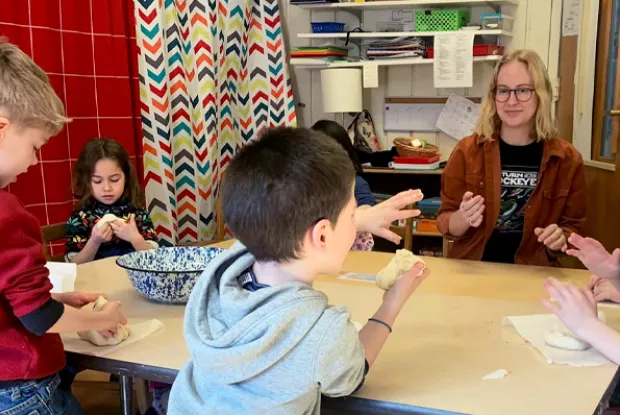
Resources & Partners
Contact Department of Education & Child Study
Morgan Hall
Smith College
Northampton, MA 01063
Phone: 413-585-3250
For more information about the Department of Education & Child Study, please contact Marjorie Postal. If you are interested in Teacher Licensure please contact Lynn R. Dole, Coordinator of Teacher Education.

